The political landscape in Rivers State has recently been fraught with tension, as evidenced by the recent developments in the state House of Assembly and the broader political arena.
The latest twist involves the election of Victor Oko-Jumbo as the Speaker of the state House of Assembly by lawmakers loyal to Governor Siminalayi Fubara. This move comes amid calls for Fubara’s impeachment by the state All Progressives Congress (APC) Caretaker Committee and local government chairmen, who allege a dispute involving N1.2 billion.
The crisis within the state Assembly dates back to attempts to impeach Governor Fubara, which resulted in factionalism and the demolition of the Assembly complex. Despite efforts at reconciliation initiated by President Bola Tinubu, tensions have resurfaced, particularly over the passage of the state local government amended law.
Governor Fubara, in response to the Assembly’s actions, denounced them as unlawful, sparking further discord. The APC, meanwhile, endorsed the impeachment proceedings against Fubara, leading to the election of Oko-Jumbo as Speaker by lawmakers loyal to the governor.
The People’s Democratic Party (PDP), however, condemned the APC’s call for Fubara’s impeachment, labeling it as unlawful and an attempt to undermine democracy. The PDP urged the Inspector-General of Police to intervene and cautioned against actions that could incite unrest.
The Association of Local Governments of Nigeria (ALGON) in Rivers State also accused Governor Fubara of withholding funds and undermining the local government system, vowing not to vacate office at the expiration of their tenure. They alleged high-handedness and dictatorship by the governor, calling for federal intervention to avoid a breakdown of governance.
In response, the APC leadership in Rivers State remained silent, while the ALGON legal adviser shed light on the council chairmen’s decision to remain in office and the legal basis for their extended tenure.
Overall, the political crisis in Rivers State reflects deep-seated tensions between different factions, with implications for governance and democratic institutions in the state. The involvement of federal authorities may be necessary to address the escalating situation and ensure adherence to constitutional principles.
























